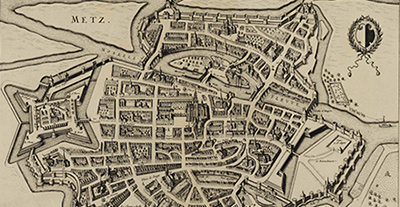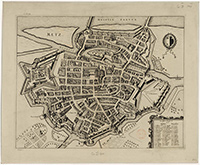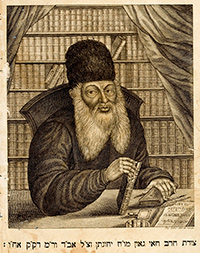About the Metz Program
This fall, the YIVO Institute and the Center for Jewish History present an exhibition (the inaugural exhibition in the David Berg Rare Book Room), a symposium and four public programs that explore the Jewish community in Metz, France in the 18th and 19th centuries. These programs were inspired by the Pinkas (Register) of the Metz Rabbinic Court, a rare and little-known document from the collections of the YIVO Institute Archives. Other programs in this series occur on October 6, October 7, October 21, November 18 and December 9.
Symposium
Hidden from History
The Pinkas of the Metz Rabbinic Court, 1771-1790
Issues and Offshoots
Largely unknown to historians, the much-neglected records of rabbinic courts represent an unusually rich source for the study of the early modern family, community, social and economic life, and jurisprudence. With the approaching publication of the Pinkas of the Metz Beit Din, and following the recent appearance of the Frankfurt rabbinic court diary, “Hidden from History” will explore the range of issues that came before rabbinic courts in the last third of the eighteenth century and the implications of these records for the construction of memory and historical narrative.
Jay R. Berkovitz, University of Massachusetts, Amherst, Convener
Click here to view the archival video of the symposium.
Sunday, October 6, 2013
9:30am – 6:00pm
$15 general admission | $10 CJH/YIVO members, seniors & students
Purchase Tickets Online
Welcome: Judith Siegel, CJH and Jonathan Brent, YIVO
Metz—Then and Now Greetings from Rabbi Bruno Fiszon, Chief Rabbi, Metz Jewish Community
Session 1: Rabbinic Court Records as Untapped Sources of History
Chair: Ephraim Kanarfogel, Yeshiva University
Protocols of Justice: The Metz Pinkas Beit Din, 1771-1790
Jay R. Berkovitz, University of Massachusetts, Amherst
A Trail from Two Cities: The Court Records of Metz and Frankfurt
Edward Fram, Ben-Gurion University
Discussant: Suzanne Last Stone, Cardozo Law School
Session 2: Domestic Issues in Historical Perspective: The Family in Court and Community Records
Chair: Marsha Rozenblit, University of Maryland
Family, Gender, and Social Structure in a Pinkas of Altona
Elisheva Carlebach, Columbia University
Dividing Marital Assets: Rabbinic Courts in Europe and New York
Ronald Warburg, Rabbinic Court Judge, New York
Discussant: Sarah Maza, Northwestern University
Lunch / Coffee Break
The Legacy of the Metz Beit Din in the Twenty First Century – Rabbi M.A. Halevi Bamberger, Rosh Bet Din/Head of the Jewish Court, Metz Jewish Community
Session 3: The State and the Jews: Law and Power in Pre-modern Europe
Chair: Adam Teller, Brown University
Jews' Knowledge and Use of State and Church Laws in the Early Modern Era
Magda Teter, Wesleyan University
The Power and Ambitions of the Parlement of Metz in the 18th Century
Ronald Schechter, the College of William and Mary
Discussant: Isser Woloch, Columbia University
Session 4: Roundtable Discussion: (Re)shaping the Past and the Future: Memory and Multiple Historical Narratives
The sources highlighted in this symposium, especially those referring to women, commercial relations between Jews and non-Jews, and the nexus between Jewish and general law, challenge conventional accounts of pre-modern Jewish history that emphasize the separation of Jews from general society. This session will consider the role of legal sources in constructing and reconstructing historical narratives. How is memory of the past shaped and reshaped by the recovery and rediscovery of forgotten or unknown texts? Participants will consider these issues from their own geographical or thematic expertise.
Chair: Jay Berkovitz
Panel participants:
Debra Kaplan, Yeshiva University
Kenneth Stow, Haifa University
Adam Teller, Brown University
Magda Teter, Wesleyan University
For more information, please contact Chris Barthel at cbarthel@cjh.org.
Circles of Justice: Law, Culture and the Jews of Metz in 18th Century France
October 6 – January 30, 2014
Presented here to the public for the first time, the civil proceedings of the Metz Beit Din (Rabbinic Court) represent an exceptionally fertile resource for investigating vitally important topics in law and history. Equally significant, the publication of these nearly forgotten records offers an occasion to reexamine French Jewish life at the dawn of the Revolution, when the emancipation of the Jews first came to the attention of the public. This exhibition provides a glimpse of Jewish custom, culture and community on the brink of modernity, highlighting those areas that distinguished the Jews from their French neighbors and, no less important, the life they shared.
Events
Roundtable Discussion: Monday, December 9, 2013 | 6:30pm
French and Jewish: Defining a Modern Jewish Identity in the 19th Century
For the Jews of France, the attainment of citizenship in the early 19th century was far more than a political triumph. The transition from ghetto to emancipation heralded a major transformation in Jewish status, and nowhere was the metamorphosis more striking than in Metz. Looking at the Jews through the lens of French literature, politics, and religion, three scholars (Jay Berkovitz, University of Massachusetts, Amherst; Lisa Leff, American University; Maurice Samuels, Yale University) will consider the far-reaching impact of Jewish emancipation on the meaning of being Jewish in the modern world.
Past Events
Ruth Gay Seminar: Monday, October 7, 2013 | 1:00pm
Jewish Scholars and Scholarship in 18th Century Metz
Rabbi Moshe Arye Bamberger, the Head of the Bet Din of the Jewish community of Metz, France presented a seminar on a new publication, Torat Chachmei Metz, or The Torah of the Scholars of Metz, which is based on an original manuscript in the YIVO Archives. This manuscript includes original interpretations and teachings of several important figures in 18th century Metz, such as Rabbi Yonasan Eybeschutz, Rabbi Arye Leib Ginzberg (the head of the Bet Din of Metz from 1765-1785), Rabbi Shmuel Hillman and others. Rabbi Bamberger's presentation included an overview of the scholars of Metz represented in this new book, within the context of the history of this important Jewish community during the early modern period. Rabbi Shmuel Klein, YIVO Archives moderated.
Panel Discussion: Monday, October 21, 2013 | 6:30pm
Sex, Yiddish and the Law: Jewish Life in Metz in the 18th Century
How will evidence of the cultural, legal and sexual lives of members of the Metz Jewish community challenge our assumptions about Jewish modernization, religion and life in pre-revolutionary France? Join Jay Berkovitz (author of the upcoming Protocols of Justice: The Pinkas of the Metz Rabbinic Court, 1771-1789) and Magda Teter (scholar of early modern religion and law) for a rare look at three individual court cases recorded in the Pinkas (Register) of Metz.
Concert and Lecture: Monday, November 18, 2013 | 8:00pm
Charles-Valentin Alkan: His Life and Music
Alkan (1813-1888) was a remarkable and enigmatic composer and virtuoso pianist—and a friend and rival of Chopin and Liszt. This year marks the 200th anniversary of his birth. Alkan’s family roots were in Metz, but he was born and lived most of his life in Paris. His striking compositions reflect his intellect and culture as well as his strictly Orthodox upbringing. Students from Mannes College, The New School for Music perform a wide range of Alkan’s music, including solo piano, chamber, concerted and vocal works. Many of the works played at this event will be New York premieres. Donald Wagner, a leading authority on Alkan, will offer comments and context on Alkan’s life and music. Fifty years ago, New York was the site of an event that galvanized the modern revival of interest in Alkan.
Among the pieces that will be included are:
Le Festin d'Esope (from Op. 39 Douze Etudes)
Le Vent (from Op. 15 Trois Morceaux)
Andante with strings in C sharp major (from Op. 13 Trois Andantes)
2er Verset du 41me Psaume for soprano and piano
and selections from the chamber music, Esquisses Op. 63, Preludes Op. 31 and Les Mois Op. 74




